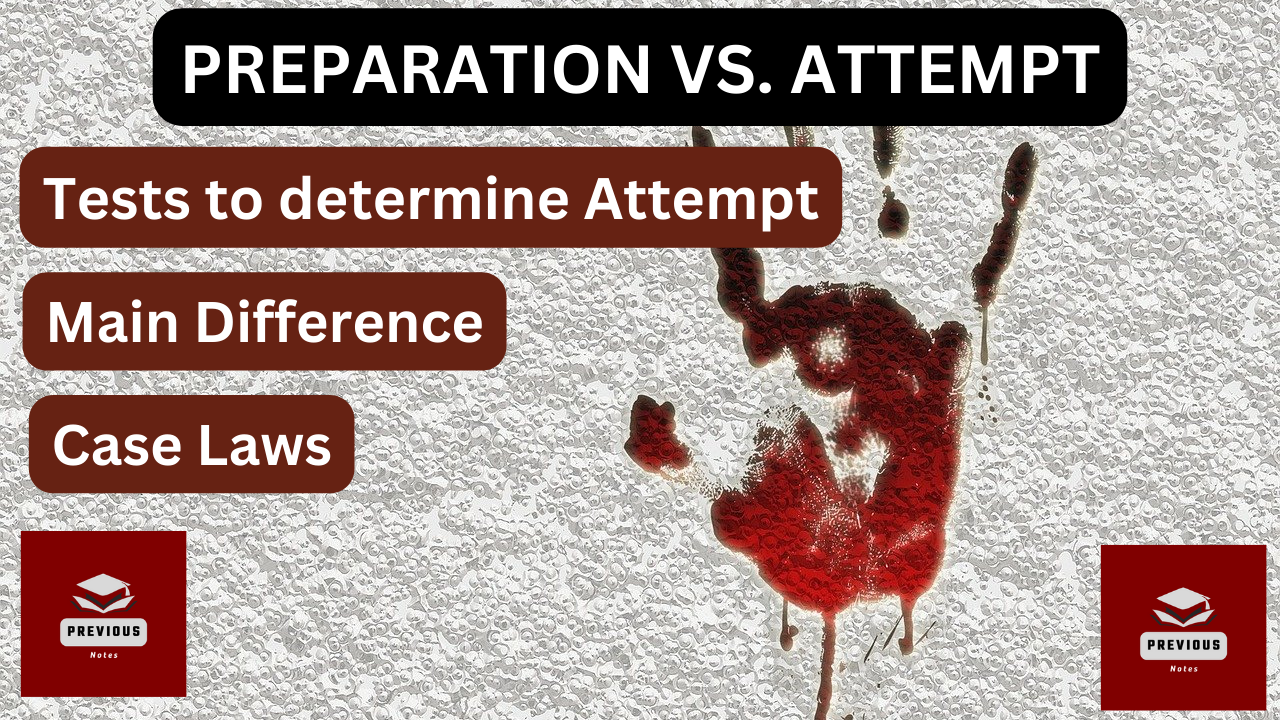Preparation and Attempt
Both Attempt and Preparation are the main stages of the crime. As Preparation generally is not treated as crime, defendant takes advantage of this point and tries to prove that act he/she has committed is not Attempt but Preparation so that they cannot held liable for criminal liability. We will discuss this with example in our case law. We have discussed it in detail. Let’s discuss the main pointers related to Preparation and Attempt.
1. Preparation:
This stage involves planning or arranging the means necessary to commit the crime. It might include actions such as buying tools, gathering information, or creating a plan. Mere preparation is generally not punishable unless it involves illegal acts (e.g., possession of illegal tools or substances). But in IPC, many provisions are given where preparation itself is treated as crime, these are:
Provision where Preparation is Punishable?
- Section 122: Collecting arms, etc., with intention of waging war against the Government of India:
- Section 399: Making preparation to commit dacoity:
- Section 233-235: Counterfeiting coin:
- Section 255: Possession of instruments or materials for counterfeiting Government stamps:
- Section 402: Assembling for purpose of committing dacoity:
Attempt:
An attempt occurs when the person takes direct action towards committing the crime, but the crime is not completed. This stage is punishable because it demonstrates the clear intent and steps taken towards completing the criminal act. The legal threshold for what constitutes an attempt can vary, but it typically requires a substantial step towards the commission of the crime.
Attempt: “An ‘Attempt to crime’ is when someone tries to commit a crime but fails.
“A direct movement towards the commission of a crime”.
‘Attempt’ is not defined in the Indian Penal Code. Section 511 of the IPC only dealt with punishment for attempting to commit offences.
In the Indian Penal Code (IPC), several sections deal with the concept of “attempt.” An attempt to commit a crime is recognized as a punishable offense even if the crime is not ultimately completed. Here are some key sections related to attempts under the IPC:
- Section 511: Punishment for attempting to commit offenses punishable with imprisonment for life or other imprisonments:
- Section 307: Attempt to murder:
- Section 308: Attempt to commit culpable homicide:
- Section 309: Attempt to commit suicide:
- Section 393: Attempt to commit robbery:
Why Attempt is Punishable?
- To create social deterrence
- For the Welfare of the society.
Read Related Articles to this Topic:
DIFFERENCE BETWEEN PREPARATION AND ATTEMPT:
| S.No. | Preparation | Attempt |
|---|---|---|
| 1 | Executor Act: It is an executor act, it comes before an attempt. | Executed Act: It is an executed act. Direct movement toward commission after preparation. |
| 2 | Definition: It involves planning & arranging the means necessary to commit the crime. | Definition: It is the direct movement towards the commission of a crime. It is the manifestation of the crime. |
| 3 | Knowledge: Only the person who intends to commit the crime has the knowledge about it. | Knowledge: Once attempt is made, it is known to everyone. It manifests. |
| 4 | Stage: It is the second stage and comes after the intention. | Stage: Where preparation ends then Attempt stage begins. It is the third stage of committing a crime. |
| 5 | Punishment: Generally it is not punished. | Punishment: Attempt to do a criminal or illegal act is punishable. |
| 6 | Punishment in IPC: But there are certain sections in IPC wherein Preparation is also made punishable. Example: Sec. 122, Sec. 399, Sec. 233-235, Sec. 255, and Sec. 402 | Punishment in IPC: Section 511, Sec. 307, 308, 309, and Sec. 393 describe attempt to commit an offence. Mainly Sec. 511 deals with punishment of attempting an illegal or criminal act. |
| 7 | Example: A purchases poison from the market with intention to kill B, it means preparation is made. | Example: A person purchases poison and mixes it in the milk of B with intention to kill her. It is attempt. |
Related Topics and Links:
DOMESTIC VIOLENCE AS TORT | APPLICATION OF TORT LAW
Crimes without Mens Rea? Statute without Mens Rea.
Definition of crime by various jurists, Criminology
Methods of Studying Criminology
All about Capital Punishment with Case Laws
IMPOSSIBLE ATTEMPT | ATTEMPT VS IMPOSSIBLE ATTEMPT
Euthanasia in India, Right to die with Dignity
Right to Privacy Case Law Mr. X vs. Hospital Z
Federal Constitution Definition and key points
University of Madras vs. Shantabai,1954: Article 12 Case Law
Article 20 Fundamental Right with Case Laws
Article 19 Fundamental Right of Indian Constitution with 10 Case Laws
Article 358, 359 Fundamental rights during emergency
Parliamentary Privileges and Fundamental Rights with Case Laws
Article 14 Fundamental Right with Case Laws
Article 15 Fundamental Right with Case Laws
Article 12 Fundamental Right with Case Laws
Forms of Judicial Process: Adversarial & Inquisitorial
DOMESTIC VIOLENCE AS TORT | APPLICATION OF TORT LAW
Economic Tort | Business Tort: Application of Tort Law
Crimes without Mens Rea? Statute without Mens Rea.
IMPOSSIBLE ATTEMPT | ATTEMPT VS IMPOSSIBLE ATTEMPT
Specific Principles of Criminal Law | LLM Previous Year Paper 2024 | CCSU
Specific Torts | LLM 4th Semester Previous Year Paper 2024 | CCSU
History and Basic Principles of Criminal Law | Previous Paper 2023
LLM Previous Year Paper 2023 | PRIVILEGED CLASS DEVIANCE
PENOLOGY PREVIOUS YEAR PAPER | LLM | CCSU


















Leave a Reply